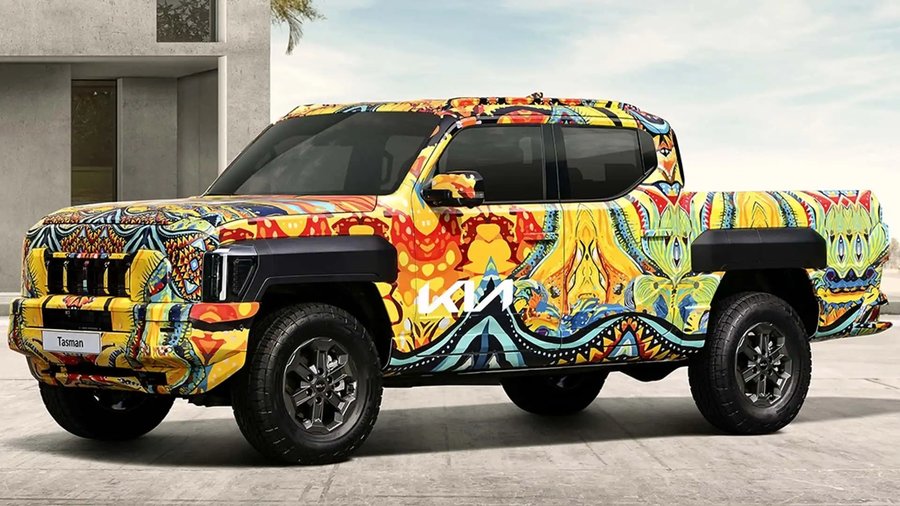New Zealand-based artist Richard Boyd-Dunlop created the wrap to highlight what Kia refers to as the Tasman's adventurous spirit. While the design is certainly eye-catching, it can't hide the truck's boxy proportions. The tall, upright front end features vertical slots (though not enough to draw a dark storm of disapproval from Jeep's legal team), lights pushed as far out as possible to emphasize the truck's width, and an air dam below the bumper. We also spot black plastic trim on the wheel arches, roof rails, and steps integrated into the rear bumper's corners.
Interior photos haven't been revealed, and we're guessing that the Kia Tasman will have similarly rugged and boxy styling inside, with variations in color and materials depending on trim level. Specifications aren't available, either, but our crystal ball tells us power will come from a turbodiesel four-cylinder engine. Buyers will likely have several drivetrain options to choose from, including rear-wheel-drive and part-time four-wheel-drive with a two-speed transfer case.
Kia notes that the Tasman will be available in numerous global markets including South Korea, Australia, Africa and the Middle East, which suggests that the model will be offered in several configurations ranging from a bare-bones workhorse with steel wheels to an upmarket family hauler with a relatively nice interior. You'll note that there's no mention of Europe or the United States; and all of the reasons are related to money.
Over in Europe, draconian regulations make buying a new four-door pickup to use as a daily driver unreasonably expensive. It costs €60,000 (about $64,000) to register a new Ford Ranger in France, which pushes the total purchase price above the $100,000 mark. You don't need to be an analyst or hold a degree in economics to figure out sales are very, very low. Kia will detour the regulatory quicksand.
It's a similar story in the States, though for entirely different reasons. The Chicken Tax that went into effect in January 1964, when Lyndon Johnson was in the White House, adds a 25% tariff to imported light-duty trucks. To avoid it, Kia would either need to build the Tasman in North America (the Toyota Tacoma has been built in Mexico and is exempt) to avoid the tariff, or accept the tariff and either absorb the costs or pass it onto consumers. The latter option is almost certainly a no-go, leaving North American production as the only real viable option. As of writing, nothing suggests the truck will be made in one of the brand's American plants, but we would imagine Kia would consider it if it sees enough demand to add a production line for the truck.
For folks in markets in which the Tasman will be sold, more details will emerge in the coming months. Deliveries will start in 2025.


